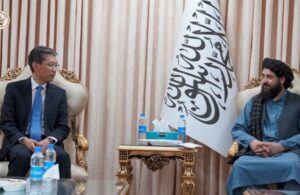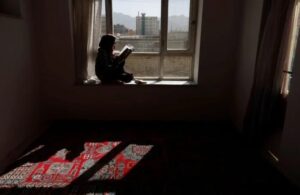KABUL (SW) – On Monday, the National Board of Examinations announced the result of this year’s university entrance examination, which was held in an unprecedented manner with the presence of only the male candidates.
The announcement of the result of this year’s entrance exam was pleasant for the boys who got favorable results; but for the girls who had prepared for it for years and were prevented from participating in this process, it was unpleasant and a reminder of the unknown fate of their academic future. The girls who were left out of the competition say that the announcement of the result of the competition has affected them a lot.
Nabila Malekzada is one of these girls, who has spent twelve years of school with excellent grades and being first grade and dreams of becoming a doctor. She says that she was banned from participating in the exam at the height of her preparation to participate in this year’s entrance exam.
Nabila adds that she suffers from being left without an unknown fate. She told Salam Watandar: “The messages that are published about girls and the fact that we are unlucky make me sad. May God remove this discrimination and difference between boys and girls from the society altogether.”
Nabila is one of the many of girls in Afghanistan who are denied the right to education.
Madina Mohammadi is another girl who was ready to participate in this year’s “Konkor”, but she was banned from participating in it. Medina says that the continuation of this situation and bad luck has caused her mental and emotional problems.
She adds: “I want to convey my message and that of the other girls to be heard by the government officials. My message is that you will face problems for your sisters and their future with these decisions.”
After announcing the results, the delegation of the Organization of Islamic Cooperation, which is currently in Kabul, in a meeting with Sirajuddin Haqqani, the Acting Minister of Interior Affairs, said that the progress of Afghanistan requires the education of girls. The members of this delegation have asked the Islamic Emirate to provide advanced science education to girls.
In response to this demand, the Acting Minister of Interior Affairs asked for the patience of this organization.
Citizens have also been waiting for two years; however, no significant step has been taken by the caretaker government to open the gates of schools and universities to girls.
Susan Khaliqyar, a women’s rights activist, criticized this approach of the Islamic Emirate and said: “A large number of students could not participate in the entrance exam because of their gender. How can they ignore the talent and hard work of women?”
Nevertheless, Ziaulhaq Shams, a sociologist, considers the negative consequences of preventing girls from learning education for the Afghan society to be worrying.
He adds: “Unfortunately, we do not see a useful and reasonable future with such decisions. It means that we will have mothers in society in the future who do not know how to take care of their children or guide them properly. How should they manage their lives, how should they plan their family economy, and how should they protect their rights from the society, and as a result, the society as a whole will head to a terrible state.”
It should be mentioned that another negative consequence of girls being prevented from taking the entrance exam is that the country’s universities will face a shortage of students.
ENDS






